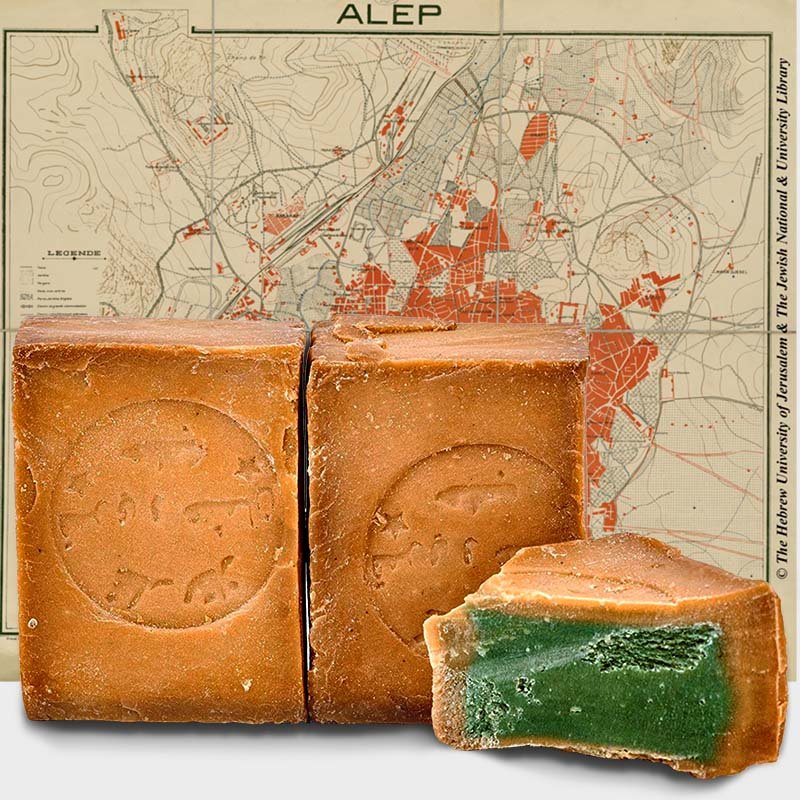ALEPPO SOAP: THE ANCESTOR OF SOAPS
Aleppo soap “the ancestor of soaps”: The world’s first bar soap is Aleppo soap. It has been carried out in Aleppo, a small town in Syria, for about 3,500 years.
It originally consisted of four pure components. These are olive oil, laurel (bay) seed and laurel (bay) leaf oil, water and natural soda. Aleppo soap transcended centuries and borders over time. He first started his journey on the Silk Road. Then he came to France in the XI century with the Crusader invasions. Crusaders. He bought this famous soap from the city of Aleppo and renamed it after the city they came to when they came to France: “Marseille Soap”.
The only difference that causes confusion between Aleppo soap and Marseille soap is that bay leaf oil is not used in Marseille soap.
Apart from that, both soaps are produced with traditional methods dating back to years. Today, even in Aleppo, traditional Aleppo soap is as difficult to find as a real Marseille soap in Marseille. But rest assured, some soap shops still follow the traditional old recipe literally.
This is good news ….
HOW IS TRADITIONAL ALEPPO SOAP MADE?
Masters traditionally make Aleppo soap with olive oil, water, natural soda (desert salt or desert salicornia), and oil from laurel (bay) leaves and seeds. In a large cauldron, olive oil is boiled with water and soda for about 20 minutes to achieve saponification. Then the oil obtained from the laurel leaf and its seed is added and the preparation is mixed thoroughly. The resulting paste thickens and turns green. Then the sunless stone is laid on the ground and left to dry for at least 9 months. Block cutting is then done manually.
Depending on the time and drying conditions, the soap changes color from light green to almost golden-brown. Finally the soaps are stamped with the brand seal before being allowed to dry again.
HOW TO MAKE A REAL ALEPPO SOAP?
Since real Aleppo soap is not so common anymore, fake Halep soaps, which are usually made with dyes, synthetic fragrances or essential oils, are widely available on the market. In fact, soaps made with oils such as palm oil, sunflower oil and coconut oil instead of laurel and olive oil are unfortunately sold as halibut soaps. Therefore, it is necessary to be extremely careful while buying soap.
To make sure you buy real Aleppo soap, it is important to note the following:
It should not be too oily to the touch
After drying our hands, it should not leave any residue and create an oily effect or feeling.
Pay special attention to its color
A real aleppo soap is golden-brown on the outside and dark green on the inside. However, soaps made with the first cold pressed olive oil may have a lighter color. In this case, this must be specified by the seller. Cut the soap in half to be sure about the color. As we mentioned on the outside, it should be golden-brown and dark green on the inside. If the color of the soap is questionable and different, you can be sure it contains dyes. And if it is stained with black spots, that’s because the oils used have bad qualities: they should be avoided!
Pay attention to the ingredient tag
The table of contents must contain the following three main components:
– Olive oil
– Bay leaf and seed oil
– Herbal soda-caustic
So be careful with the term “vegetable oil”, because as we have just seen, some manufacturers do not hesitate to use much cheaper oils such as sunflower or even peanuts instead of these precious oils.
Aleppo Soap must be stamped
Look at all six faces of soap, one side of the soap must be stamped with an arabic stamp indicating who the soap maker was.
Smell
Aleppo soap has a distinctive and distinctive scent, first of all olive oil, then sensitive noses smell of laurel.
Does the soap smell like lavender or rose?
This should alert you: this is not real Aleppo soap!
Test it
You can test the soap before you buy it: If the soap is too harsh, be careful, it’s probably made from coconut oil.
Another important issue is that the halo soap normally foams very little.
See the price
Real Aleppo soap is expensive. It is the very valuable and expensive laurel oil used in its content that determines its price. Some soaps contain only 1% laurel oil, some may contain up to 80% laurel oil, but this is not common. The ideal ratio is 20%, 30% or 40% laurel oil.
HOW TO USE ALEPPO SOAP?
Although Marseille soap is used for laundry or interior cleaning, the situation is very different with Aleppo soap. Because of its powerful composition in olive oil and laurel oil, it is a so-called “multi-precious oil” soap that is mainly used for beauty and health care, and looks particularly effective for treatment. It is very effective in the treatment of skin diseases such as psoriasis.
Aleppo soap is hypoallergenic (literally reduces the risk of allergies) when traditionally made according to the rules of soap art and does not contain any chemical additives and is a very very beneficial soap for the skin. It owes this to the pure olive oil and laurel oil used in its content.
Olive oil:
Specifically, it contains 80% essential fatty acids and vitamins A, E, C and D, a cocktail that makes this oil a preferred remedy for the most sensitive, irritated and weakened skin. It has nourishing, moisturizing, softening and restorative properties.
Laurel oil:
Laurel oil is a symbol of power and victory, derived from laurel tree, believed to be noble, with dense and evergreen leaves.
In ancient Rome, the winners of sporting events wore a crown made from a laurel twig and leaves. Roman emperors wore a crown made of laurel wood at important celebrations and ceremonies.
Later, in the Middle Ages, newly graduated young doctors were awarded diplomas decorated with laurel leaves and fruits. The word “baccalaureate”, which expresses diploma and proficiency in English, comes from “bacca: seed, core”, “laureate: laurel”. Laurel oil protects and nourishes sensitive skin, especially by regenerating the protective hydrolipidic film normally found on the skin surface.
It is antibacterial, rich in anti-septic and anti-inflammatory compounds, and therefore purifies the skin. Aleppo soap is an astringent, refreshes and revitalizes severely damaged skin. Soothes and heals wounds.
USAGE ALEPPO SOAP IN COSMETICS
Since Aleppo soap contains very valuable compounds, we can easily use it in daily skin care. We especially recommend it in the shower, especially on dry, fragile and itchy, sunburned skin. Have a sunburn? Let’s leave it on your skin for a few minutes before rinsing to make the most of Aleppo soap. And let’s make sure our skin absorbs it well.
It is also very effective against mosquitoes.
You can use Aleppo soap if you have certain skin conditions such as psoriasis. It softens the dry skin spots that are characteristic of this disease and reduces irritation. Does your child suffer from acne? Think of Aleppo soap as well. It opens pores and eliminates sebum plugs responsible for blackheads and pimples.
It is ideal for daily skin care of babies. We can use it as a “mask” to remove birthmarks and dandruff on the skin and heads of newborns. When used in hair care, it eliminates dandruff. And it prevents cuts, red spots and irritation when shaving the toughest beards.
OTHER AREA OF USAGE ALEPPO SOAP
We use Aleppo soap mostly for beauty and health, but it is extremely effective for household and especially laundry cleaning. If you make a mold and place soap in your closet, your clothes will not be safe, it is extremely effective against moth. It is very effective in removing sweat and oil stains. However, keep in mind that real Aleppo soap is expensive, it will not be economical and logical to use this valuable soap for laundry!
Our Premium Aleppo soap contains dense olive oil and the laurel oil it contains are supplied by local producers from Mardin-Derik and Hatay-Antakya . (TURKEY)
- Our Premium Aleppo soap is rich oil content makes your hair soft and shiny ; On the other hand, it nourishes your hair and helps it grow healthily.
- You can use our Aleppo soaps, which do not contain any additives , fragrance , animal product and dye , not only for your hair , but also for your personal cleansing and your skin care .
- Our Aleppo soaps are produced with 60% olive oil and 40% bay oil .
- Aleppo soap is produced by hand in large blocks using traditional methods.
- Later, we cut them into large blocks and rested and dried. Drying is done only in specially designed wooden cabinets.
- The soap making process takes at least six months .
- Our Aleppo soap, like all of our soaps, is the healthiest soap you can count on for your hair and skin.
- The richness in vitamin E contained in its oils and the privilege of its production make it one of our most special soaps.
- We recommend this soap to anyone with hair loss problems with dyed and treated hair .
- In addition, due to its anti-allergic, anti-inflammatory and antiseptic properties, dermatologists particularly recommend this soap for irritated and irritated skin problems like allergy, psoriasis and eczema.
- It prevents inflammation, bacteria and acne formation on the skin.
- Phytosterols are nutritious and antioxidants.
Other uses of Aleppo soap:
- As a shampoo to cleanse the scalp and hair.
- To regulate scalp oil.
- Giving shine, volume and softness to the hair.
- Face and body hygiene.
- Intimate hygiene.
- As a face mask.
- Shaving soap.
- Aftershave facial softener.



Thank you for this beautiful article.
Thanks Nathalie 🙂
Thank you for your sharing. I am worried that I lack creative ideas. It is your article that makes me full of hope. Thank you. But, I have a question, can you help me?
Of course I would like to help you. What is your question?
Can you be more specific about the content of your article? After reading it, I still have some doubts. Hope you can help me.